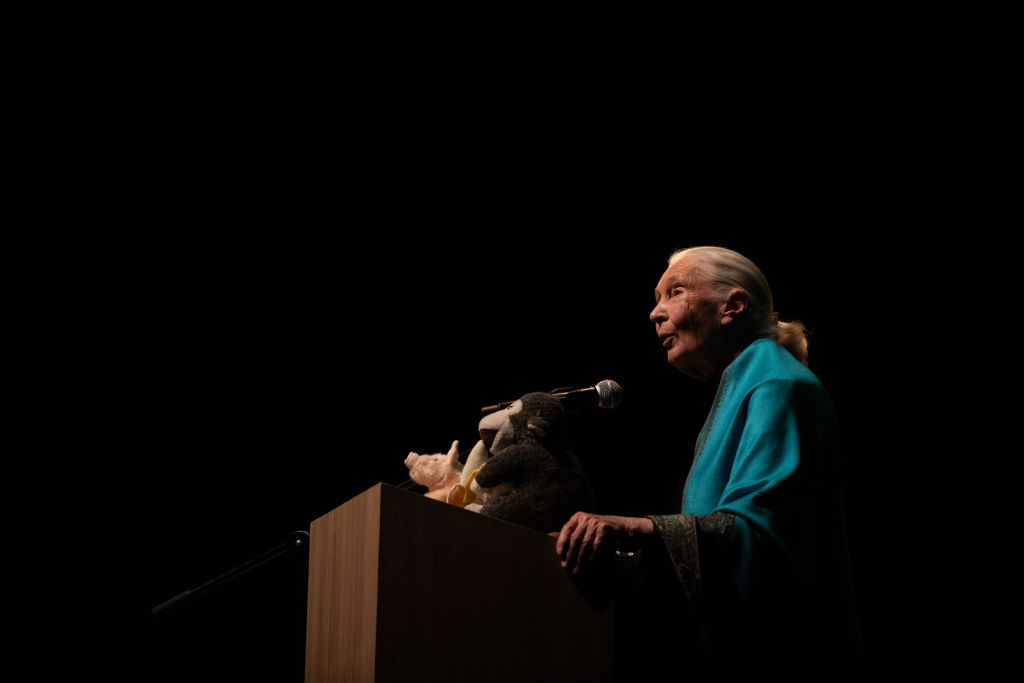On Nov. 12, 2025, at the Washington National Cathedral, people from across the country gathered to celebrate the life of Dr. Jane Goodall—scientist, storyteller, and moral compass for our relationship with the natural world. It feels almost impossible to imagine a world without Jane’s voice: calm but unyielding, grounded in compassion, and fierce in truth. And yet, as we mourn, her memory lives on.
[time-brightcove not-tgx=”true”]
My last meeting with Jane was in March of this year, and it was characteristic of her tireless effort to make the world a better place. After a full day of meetings with Senators on Capitol Hill in Washington, D.C., she joined a five-year celebration of the Trillion Trees Initiative, 1t.org, which she helped to launch in 2020. She spoke passionately about the need for all of us to step up and lean in for nature.
“I have not taken a vacation in 30 years,” she told me, only half joking. “There is just no time!”
Her sense of urgency to fix our relationship crisis with nature was always top of mind for her. It was the reason she spent 300 days a year traveling the globe, even at age 91, to spread hope as a powerful seed for collective action.
Notedly, Jane wrote the foreword to my book Generation Restoration—which was released two weeks after her passing. “Unfortunately, though we are unquestionably the most intellectual creature that has ever lived on Planet Earth, we cannot claim that we are the most intelligent—if we were, we would not be destroying our only home,” she Jane wrote with her characteristic clarity.
Jane never shied away from calling out the pitfall of our age: a loss of wisdom, a growing distance between humans and nature, and a dangerous illusion that we can consume resources infinitely on a finite planet. But she also believed, profoundly, in our capacity to develop the collective intelligence, wisdom, and willpower to restore our relationship with nature.
Her faith in human potential never wavered, not because she ignored the damage, but because she saw the resilience in both nature and people. And she saw that restoring nature to its full abundance and diversity around the world would make life better for all species, including humans. Restoring ecosystems at scale, such as the oyster reefs around New York City, the Everglades of Florida, the world’s coral reefs, and the Amazon rainforest, will not only stabilize the climate. It will also make all of us healthier, happier, wealthier, and more connected to the fullness of life. The natural state of nature is one of abundance and diversity, and we can get back to that abundance within one generation.
To do so will require breakthrough scientific research, innovative finance strategies, and greater technical skills. We also need a new step in human evolution—a moral and spiritual awakening that aligns our intelligence with wisdom, our consumption with compassion. Jane understood this instinctively and believed that the natural world needed to be the grounding force of government policy, business practices and everyday life.
This is not just an environmental plea—it is a civilizational one. Nature is our most critical infrastructure that we need for all of our societies to function. Nature provides everything we eat, drink, and build our homes and cities with. But the days of taking nature for granted, and only ever taking from nature without giving back are over. We need to reset our relationship with nature, and restore nature at planetary scale, so we can enjoy the natural abundance and diversity that a planet with 10 billion people needs. Jane challenged us to redefine success, to replace greed with gratitude and stewardship, and to “to work together in the greatest restoration project ever undertaken.” She knew the fight for the planet’s future is not about technology alone—it is about the human spirit.
When Jane spoke of restoration, she meant more than planting trees or saving species. She meant restoring ourselves—our sense of belonging, and of our reverence for life.
As the world tuned in to her memorial service, streamed live by the Jane Goodall Institute, we not only remembered Jane—we recommitted to becoming what she called us to be: a generation committed to restoring the environment.
We must be the generation that fixes our relationship crisis with nature, and restores the necessary balance between the economy and ecology. We can only manage planet Earth if we understand well how it actually works. And if we move from a relationship with nature that is purely extractive to one that is reciprocal.
Jane spent her life fighting to improve our relationship with our planet—and she spent her final years calling for us to begin a “new era of moral and spiritual evolution.”
That evolution begins with us—today, tomorrow, and in every act of care for this fragile, miraculous planet, and for each other.

